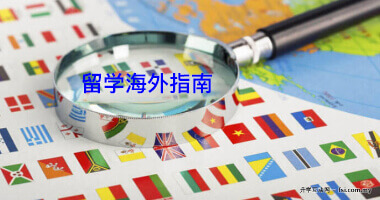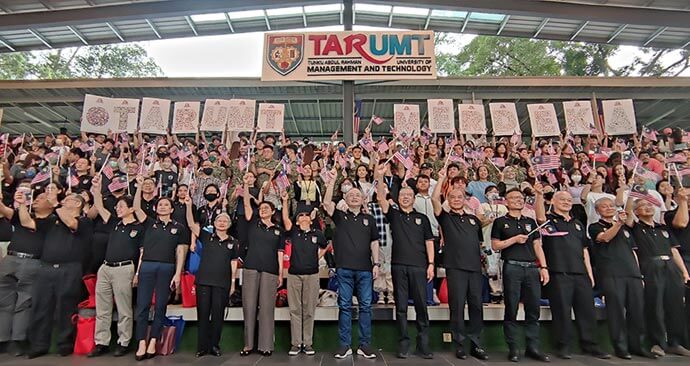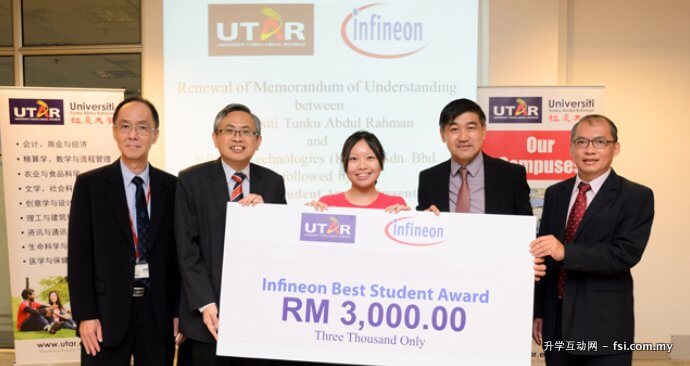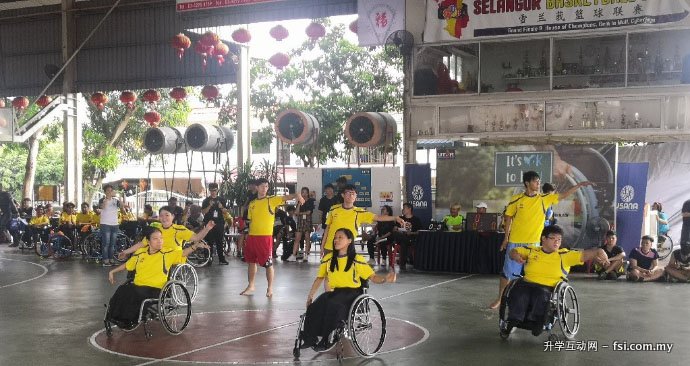The Faculty of Science (FSc) and the Malaysian Institute of Medical Laboratory Sciences (MIMLS) jointly organised the “Celebration of International Biomedical Laboratory Science (BLS) Day” on 15 April 2022 at UTAR Kampar Campus.
Themed ‘Guardians of Quality and Patient Safety: Biomedical Laboratory Scientists’, BLS day is an annual celebration established by the International Federation of Biomedical Laboratory Science to promote and celebrate the key role of Biomedical Laboratory personnel. It aims to increase awareness of the role that Biomedical Laboratory Scientists have in providing health care, including key roles in diagnosis, quality development and assurance, treatment, research and development in the modern medical sciences. The theme is usually used for two years.

From left: Tan, Harvinder, Dr Sit, Tan Sri Muhamed Salleh, Prof Dato’ Ewe, Dr Phoon and Dr Teh officiating the event.
The inaugural celebratory day was officiated by Chairman of Spectrum Education Group Prof Emeritus Tan Sri Dato’ Dr Mohamed Salleh bin Mohamed Yasin and UTAR President Ir Prof Dato’ Dr Ewe Hong Tat. The opening ceremony was witnessed by Faculty of Science (FSc) Deputy Dean for R&D and Postgraduate Programmes Dr Phoon Lee Quen, FSc Deputy Dean for Student Development and Industrial Training Assoc Prof Dr Sit Nam Weng, President-elect of MIMLS Tan Kian Shing, President of MIMLS Harvinder Kaur Lakhbeer Singh, and Department of Allied Health Science Head Dr Teh Lai Kuan, along with other esteemed MIMLS guests, UTAR staff, students and participants.

Prof Dato’ Ewe highlighting the importance of appreciating MLTs.
Prof Dato’ Ewe said in his speech, “This day provides an opportunity to appreciate the contributions of biomedical laboratory scientists and technicians in the diagnosis, treatment, and prevention of diseases. As guardians of quality and patient safety, biomedical laboratory scientists must adhere to strict quality control and quality assurance protocols to ensure that their test results are accurate and reliable. They also play a critical role in identifying and reporting potential errors or deviations in test results that could affect patient care. In addition to their technical skills, biomedical laboratory scientists are also trained to communicate effectively with other healthcare professionals to ensure that test results are interpreted and used appropriately. They must also maintain patient confidentiality and adhere to ethical and legal standards in their work. Overall, biomedical laboratory scientists are essential members of the healthcare team and play a vital role in ensuring quality and patient safety in healthcare.”
He added, “Today we celebrate the hard work, dedication, and commitment of these professionals to patient care and public health. It also provides an opportunity to raise awareness of the importance of quality laboratory testing and the need for ongoing education and professional development. I believe today’s celebration will be an opportunity to promote the importance of laboratory testing and the need for continued investment in laboratory infrastructure and technology to the participants.”
After the opening ceremony, participants were enlightened by the talk on “History of Biomedical Laboratory Profession in Malaysia” by Tan Sri Mohamed Salleh. The former Vice Chancellor of Universiti Kebangsaan Malaysia (UKM) and Founding Dean of the first Faculty of Allied Health Sciences in Malaysia started by sharing his vast experiences in Health Sciences.

Tan Sri Muhamed Salleh elucidating the history of Biomedical Laboratory Profession.
He continued by elucidating the history of Medical Laboratory Technologist (MLT)’s training in Malaysia which started in the 1970s. He explained that in the past, MLT training was done in-house at Certificate and Diploma levels; their roles were to conduct laboratory analysis of clinical specimens, research, teaching; and basic Medical Sciences graduates in Anatomy, Biochemistry, Microbiology, Immunology, Pharmacology, Parasitology, Physiology were also employed by the Ministry of Health (MOH) and Medical Faculties of UM and UKM. He also emphasised that health care is a team effort by the Allied Health and Medical specialists. The first Biomedical Sciences degree programme, according to him, was offered in 1990 in UKM then UM, UPM, and the first Faculty of Allied Health Sciences was established in 1992 in UKM.
Participants were also enlightened on the Framework for Sustained National Development in Health and Medicine (2011-2050), and the recommendations of human resources in the fields of medical devices and diagnostics; stem cells; genomics; natural products; pharmaceuticals; vaccines; nanotechnology; health tourism; ICT in health; and traditional and complementary medicine.
At the end of his talk, he highlighted that the development of human resource in health is in line with Malaysia’s aspiration to provide excellence in healthcare, identifying and fulfilling gaps needed with changing environment. It also augurs in wealth creation by targeting clinical research, generic export products, health tourism, diagnostic services, world class, healthcare & bioscience as Entry Points Projects (EPP) and initiatives. Participants also learnt that there was a shift from healthcare ractitioners to R&D & I (innovation) experts, which calls for the need to look into the challenges and opportunities of integrating R&D & I in healthcare practices.
He also advised the audience to constantly realign and be adaptable to the demands and changes of the industry; one needs to be committed to constant knowledge acquisition; learning new approaches; updating institution curriculum and programmes; gaining professional recognition locally and internationally as well as embracing internationalisation and digitalisation.

Prof Dato’ Ewe (left) presenting tokens of appreciation to Tan Sri Muhamed Salleh.

Tan speaking about the history of MIMLS.
The talk titled “Introduction to MIMLS and the background of international BLS Day” by Tan gave insights to participants on the formation of MIMLS and BLS Day. He shared that the attempts to MLTs started in 1967, which led to the formation of three MLT organisations in Malaysia. In 1986, the three organisations were unified and named as Malaysian Federation of Medical Laboratory Technologist (MFMLT), and finally in 1992, MFMLT was incorporated as MIMLS. He then continued sharing the objectives and involvements of MIMLS over the years, and the recent activities conducted. Participants were also taught the processes involved to register as a member of MIMLS, and the benefits of being a member.

Harvinder explaining the purpose of the act.
Following after was the talk by Harvinder on “Allied Health Profession Act 2016 (Act 774): Understanding the What, Why, and How”. She explained that the act was gazetted on 18 February 2016 and came to force in 2020 with amendments to Second Schedule. The purpose of the act was to ensure all allied health practitioners are regulated within their scope of practice.
Participants were informed that the act consisted of two schedules, eight parts and 46 sections. According to Harvinder, the act provides for the establishment of all Malaysian Allied Health Professions Council (MAHPC); registration of persons practising as allied health practitioners and those who carry out activities relating to allied health; regulation of the practice of the allied health professions; and related matters. She continued with the objectives of MAHPC, and elaborated on the sections in the acts along with the offences, scope of practice, qualifications for registration, and the commitments of regulated practitioners.
Before the event concluded, participants were also given insights into available careers and potential in the field through career talks. The physical career talks given were “Career and Personal Experience of Medical Laboratory Scientist” by CEO & Laboratory Director of Gnosis Laboratories Yee Jo-Kuan; “The Role of Biomedical Scientists in the Medical Device Industry” by Trust Diagnostics Sdn Bhd Business Manager Chin Yin Yien; while the virtual talks on career experience were given by MedicSkills Sdn Bhd Training/Sales Coordinator Nur Amirul Farhana binti Muhammad Kamal and IP Sense Sdn Bhd Managing Director Jasdeep Singh.

Physical career talks by Yee and Dr Chin.
Online Education Fair 线上教育展
Universiti Tunku Abdul Rahman (UTAR)
拉曼大学 (優大)
https://edufair.fsi.com.my/utar












